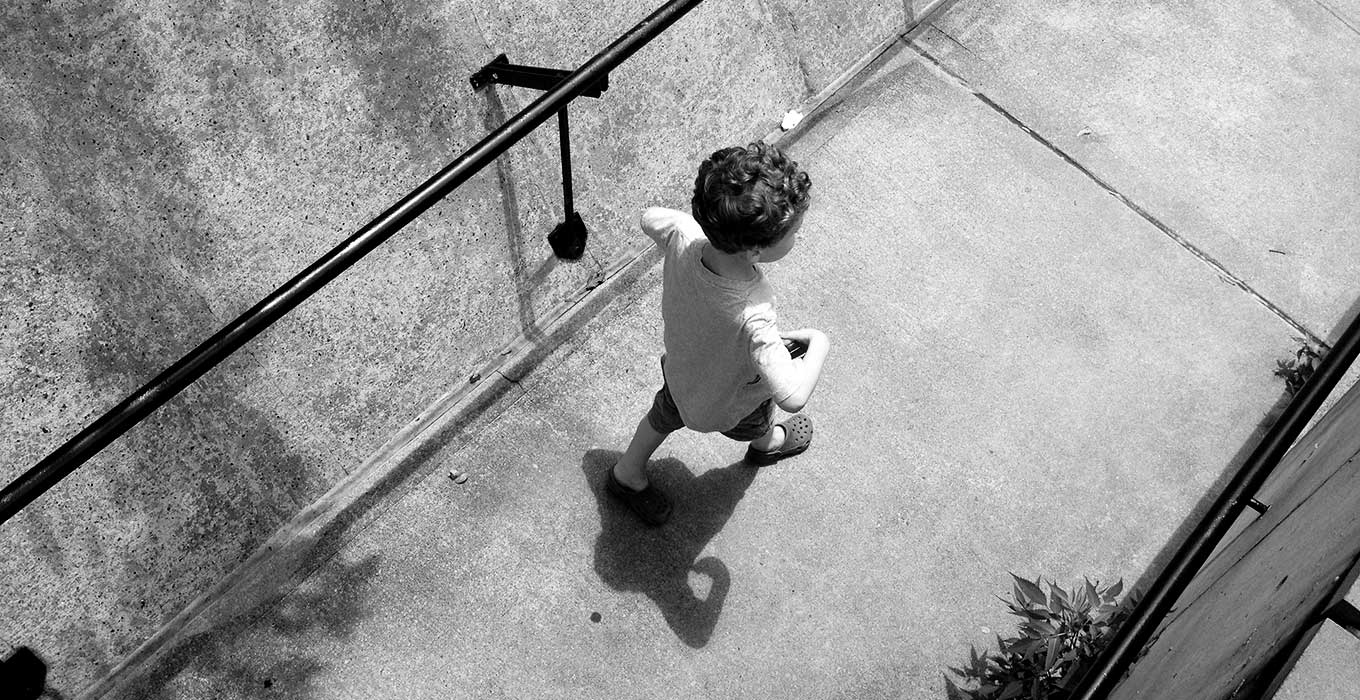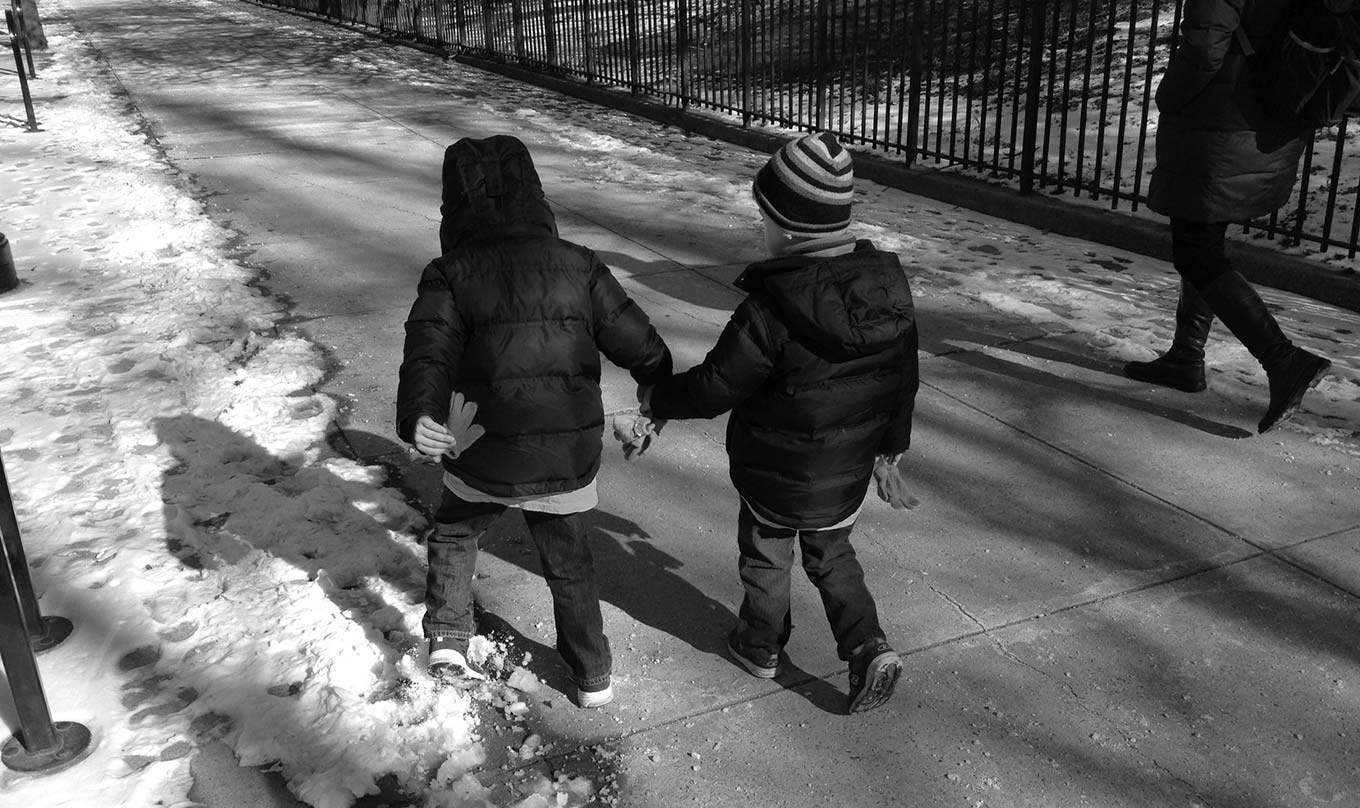When I'm in the playground / museum / grocery store / wherever with C, I know that at any moment he might wander off (quite quickly, I might add). Sure, you say, that's what children do: they wander. Every parent has a story about their child disappearing momentarily, and the ensuing panic until reunited.
Ah, but there's a difference: with many ASD children, they don't even realize they're lost. They'll just keep moving, following whatever new thing interests them along the way — a shiny car, a sprinkler sputtering down the street, a fence just made for dragging fingers across.
What's worse, however, is that many ASD children are non-verbal, or if they're verbal (like C), won't really know how to answer questions like "Where is your Mommy?" or even, "Are you lost?" In fact, C would probably think the whole situation was, well, kind of funny. And he certainly doesn't know how to approach an adult if lost, let alone how to tell a potentially dangerous adult from one who's not.
We learned early on that eloping — as this tendency to wander is called — is very dangerous for ASD kids. By some measures, half of all children with ASD elope; for ages 4-10, ASD children are nearly four times more likely to elope, and from ages 7-10 the rate is eight times higher than typical kids. This leads to higher rates of serious injury and death; two-thirds of parents whose ASD children have eloped report close calls with traffic injury, and one-third report near-drowning incidents.
Last week's sad news of three ASD children dying in separate incidents after each had eloped reaffirmed our deepest fears: someday, despite how much we watch over him, C could just disappear from us. Would he know he was lost? If so, would he know how to get help? I honestly don't know, but I have my doubts, at least at this point in time.
Then there's the future: an acquaintance recently told me about their 15-year-old niece with autism who frequently gets up in the middle of the night and simply walks out of the house and down the street. Sometimes the family doesn't notice she's gone until the morning. They've added extra locks and other security measures, but even those don't necessarily thwart the efforts of a determined teenager.
So what do we do?
Well, we don't go a lot of places where there's the potential of getting separated from C. And when we go out, we try to stay as close as possible, even when that means getting the "Oh, you must be Helicopter Parents" look from other parents. My wife and I have inadvertently developed facial expressions that communicate things like, "Do you have him in your sights?" or "Can you watch him while I go with M?" or the desperately wide-eyed, "I don't see him…do you?!"
We drill C on our phone numbers and address, all of which he's easily memorized; but when anyone asks him a serious question, he's as likely to answer nonsense as fact, especially if he's agitated or distracted.
And while we do our best, what about other caregivers? What about his occasional field trips with school? What happens when there are 10 or more ASD kids to look after? We just have to put those thoughts out of mind when we can't be there, lest we drive ourselves mad.
We are, however, considering a tracking device. At one point in my life, I would have thought the notion of such a device outlandish, but if C ever does disappear, I'd never forgive myself if I hadn't taken every step possible to get him back as quickly and safely as possible.
Eloping, or wandering, is a concern every parent has, I know. But with a child who doesn't realize he's lost, can't really communicate if found, and with few real survival skills (or even reasonable fear of things like traffic or bodies of water), that dread — like all things touched by autism — is magnified. In the meantime, we'll just keep watching, training, and hoping.
 "When I was small, I didn't even know that I was a kid with special needs. How did I find out? By other people telling me that I was different from everyone else, and that this was a problem." — Naoki Higashida, The Reason I Jump
"When I was small, I didn't even know that I was a kid with special needs. How did I find out? By other people telling me that I was different from everyone else, and that this was a problem." — Naoki Higashida, The Reason I Jump
 C is a boy who, at four, can read full sentences, complex words, and short books; if it's 6:51, he can tell you how many minutes until it's 6:58; he's memorized nearly every street in our neighborhood and can represent them with toy train tracks; he knows all the stops on the Q train from here to Brighton Beach; he knows the color of every single NYC subway line; if you ask him what number J is, he'll say "ten" without hesitation, because that's where J falls in the sequence of letters in the alphabet.
C is a boy who, at four, can read full sentences, complex words, and short books; if it's 6:51, he can tell you how many minutes until it's 6:58; he's memorized nearly every street in our neighborhood and can represent them with toy train tracks; he knows all the stops on the Q train from here to Brighton Beach; he knows the color of every single NYC subway line; if you ask him what number J is, he'll say "ten" without hesitation, because that's where J falls in the sequence of letters in the alphabet. When the evaluator finished telling us that, yes, C definitely had autism, I asked what this meant for his future. She sighed, said that was a common question, and then offered us the best advice we've received so far: "Don't try to predict where your son will be in ten years, one year, or even a month. No one knows, and anyone who tells you they do is lying. These kids can surprise us, both for the better and the worse."
When the evaluator finished telling us that, yes, C definitely had autism, I asked what this meant for his future. She sighed, said that was a common question, and then offered us the best advice we've received so far: "Don't try to predict where your son will be in ten years, one year, or even a month. No one knows, and anyone who tells you they do is lying. These kids can surprise us, both for the better and the worse." Losing one's hair can have its advantages: in my case, it's been accompanied by the understanding that some emotions are mostly useless and often harmful. Here I refer in particular to regret and fear.
Losing one's hair can have its advantages: in my case, it's been accompanied by the understanding that some emotions are mostly useless and often harmful. Here I refer in particular to regret and fear.